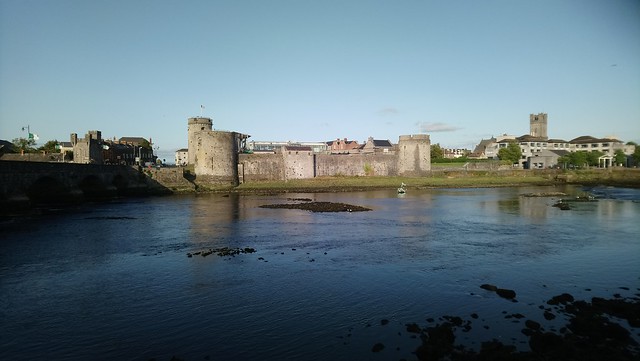Words for castles and fortresses in Celtic languages.
| Proto-Celtic | *dūnom = stronghold |
|---|---|
| Old Irish (Goídelc) | dún [duːn] = fort, fortress |
| Irish (Gaeilge) | dún [d̪ˠuːnˠ] = fort; fortress; place of refuge, haven; residence, house; promontory fort; bluff |
| Scottish Gaelic (Gàidhlig) | dùn [duːn] = fortress, heap |
| Manx (Gaelg) | doon [duːn] = fort, fastness, stronghold, bastion, earth fort, dun, fortified rock |
| Proto-Brythonic | *din [ˈdiːn] = hill, fortified hill, fort |
| Gaulish | dunum, *dūnom = fort |
| Middle Welsh (Kymraec) | din = fort |
| Welsh (Cymraeg) | din [dɪn / ˈdiːn] = city, fort, fortress, fastness, stronghold dinas [ˈdɪnas / ˈdiːnas] = city, large town; town |
| Cornish (Kernewek) | din [di:n] = fort dinas [‘dinas / ‘dinɐz ] = fort |
| Old Breton | din = fort, fortress |
| Breton (Brezhoneg) | din [dĩːn] = fort, fortress (archaic) dinas = bastion, stronghold |
Note: apart from dinas in Welsh, these words are mostly found in placenames, such as Dún Dealgan (Dundalk) in Ireland, Dún Dè(agh) (Dundee) in Scotland, Dinbych (Denbigh) in Wales, Dinmeur (Dunmere) in Cornwall, and Dinan in Brittany.
Etymology: from the Proto-Indo-European *dʰuHnom (enclosure), from *dʰewh₂- (to finish, come full circle) [source]. The English words down (a (chalk) hill, rolling grassland), dune and town possibly come from the Proto-Celtic *dūnom [source].
| Proto-Celtic | *katrixs / *katrik- / *kassrik- = fortification, fort |
|---|---|
| Old Irish (Goídelc) | ca(i)thir [ˈkaθərʲ] = stone enclosure, fortress, castle; dwelling; monastic settlement, enclosure; monastery, convent; fortified city, city |
| Irish (Gaeilge) | cathair [ˈkahɪɾʲ/kaːɾʲ] = city; enclosed church establishment, monastic city; circular stone fort; dwelling (place), bed, lair Cathair an Phápa = Vatican City cathair chorr = round fort cathair ghríobháin = maze, labyrinth cathróir = citizen cathróireacht = citizenship ardchathair, príomhchathair = capital city, metropolis |
| Scottish Gaelic (Gàidhlig) | cathair [kahɪrʲ] = city cathair-bhaile = city (with city status) cathair-stàit = city state |
| Manx (Gaelg) | caayr = dwelling place, city |
Etymology: unknown. Possibly related to the Old English hēaþor (enclosure, prison) or Serbo-Croatian kȍtar ( country, district) [source].
| Proto-Celtic | *kagrom = fort |
|---|---|
| Welsh (Cymraeg) | caer [kaːɨ̯r / kai̯r] = fort, fortress, enclosed stronghold, castle, citadel, fortified town or city; wall, rampart, bulwark |
| Cornish (Kernewek) | ker [kɛ:r / ke:r] = fort, fortress, hill fort, city |
| Breton (Brezhoneg) | ker = town, village, villa |
Etymology: from the Proto-Celtic *kagyom (pen, enclosure), from the Proto-Indo-European *kagʰyóm (enclosure, hedge) [source], which is also the root of words for hedge in Germanic languages, such as hedge in English, Hecke (hedge) in German and hæk (hedge, hurdle) in Danish [source].
Words marked with a * are reconstructions.
| Old Irish (Goídelc) | caisel = fort, castle |
|---|---|
| Irish (Gaeilge) | caiseal = (ancient) stone fort; unmortared stone wall; boundary wall (of church or cemetery); caslte (in chess); spinning top caisleán [kəˈʃlʲɑːn̪ˠ / ˈkaʃl̠ʲɑːnˠ / ˈkaʃl̠ʲænˠ] = castle, mansion, cumulus (cloud) |
| Scottish Gaelic (Gàidhlig) | caisteal [kaʃdʲəlˠ] = castle, fort, tower, garrison; turreted mansion |
| Manx (Gaelg) | cashtal = castle, citadel, surrounding wall, bulwark, rook |
| Welsh (Cymraeg) | castell [ˈkʰastɛɬ / ˈkʰastɛɬ] = castle, stronghold; castellated mansion; a kind of cloud; fortified town or city; village |
| Cornish (Kernewek) | kastel = castle, hill fort |
| Breton (Brezhoneg) | kastell = castle, fort, fortress |
Etymology: from the Latin castellum (castle, fort, citadel, fortress, stronghold), a diminutive of castrum (fort) [source], from the Proto-Indo-European *ḱes- (to cut, cut off, separate) [source], which is also the root of words for castle in most European languages.
| Proto-Celtic | *frāti- = fort, rampart *rāti- = a dugout, a digging |
|---|---|
| Gaulish | ratin = appears in place names |
| Old Irish (Goídelc) | ráth [r͈aːθ] = earthen rampart surrounding a chief’s residence, fort, rath |
| Irish (Gaeilge) | ráth [ɾˠɑː/ɾˠaːx] = earthen rampart, earthen ring-fort, rath, layer (of thatch) ráthach = having earthen forts ráth sneachta = snow-drift |
| Scottish Gaelic (Gàidhlig) | ràth [r̪ˠaː] = (ancient) fortress, mound, (ancient) royal seat; clearing, cleared swathe of land; fortress, barrow, village, town |
| Manx (Gaelg) | raah = rath, ring-fort |
| Middle Welsh (Kymraec) | bedd-rawd = cemetery |
| Welsh (Cymraeg) | beddrod = tomb, vault, grave, cemetery |
| Middle Breton | bez-ret = cemetery |
| Middle Breton | bered = cemetery |
Etymology: from the Proto-Indo-European *prehzt-i- (field). Possibly cognate with the Latin prātum (meadow) [source].
| Middle Welsh (Kymraec) | kyvelchy, gyuyllchi = circular fortress |
|---|---|
| Welsh (Cymraeg) | cyfylchi = a kind of circular stronghold or fortress |
Etymology: from cyfwlch (complete, entire, perfect, excellent). Found only in the placenames such as Dwygyfylchi [dʊɨɡəˈvəlχi], a village in Conwy county, which was first recorded as Dwykyvelchy in 1287 [source]. There is also Gyfylchi in the Afan Valley in Neath Port Talbot county [source].
Sources: Wiktionary, Am Faclair Beag, Online Manx Dictionary, Teanglann.ie, eDIL – Electronic Dictionary of the Irish Language, In Dúil Bélrai English – Old Irish glossary, Geiriadur Prifysgol Cymru, Gerlyver Kernewek, Dictionaire Favereau, TermOfis, English – ProtoCeltic WordList (PDF), Etymological Dictionary Of Proto Celtic

